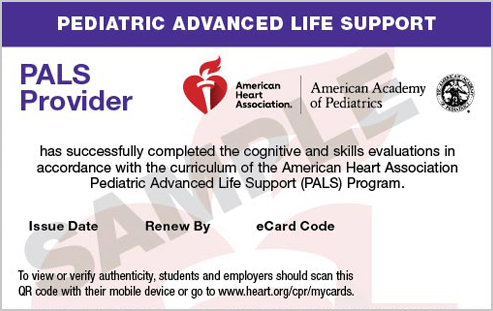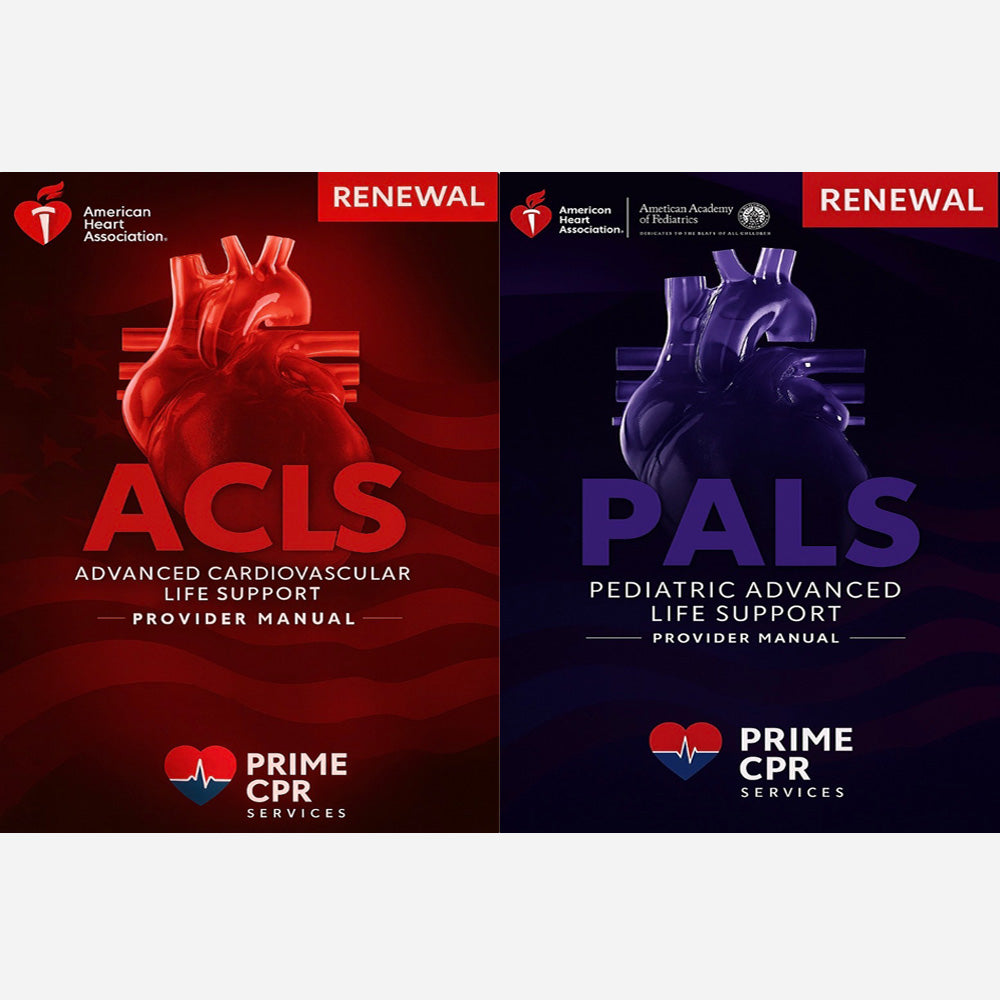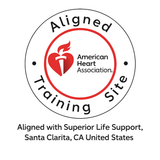Complete Your ACLS Renewal with PALS Renewal Training
Prime CPR Services offer this combo class of ACLS RENEWAL and PALS RENEWAL to make re-certification a breeze. Get the convenience of comprehensive reviews, comprehensive training materials, and experienced medical professionals in one easy class. Refresh your skills and renew your credentials with this relaxed, stress free course.
Books are shipped priority, so you will get them in plenty of time before your class. You could also purchase the ACLS ebook by clicking HERE and/or the PALS ebook by clicking HERE.


The ACLS RENEWAL course is stress-free and relaxed. It is updated with the latest guidelines from the American Heart Association Guidelines for Cardiopulmonary Resuscitation and Emergency Cardiovascular Care. It is designed primarily for healthcare professionals in emergency departments, intensive care units, critical care departments, surgical areas, or pre-hospital environments, such as physicians, nurses, paramedics, respiratory therapists, and other professionals who may respond to a cardiovascular emergency. You will get your ACLS card right after the class which is valid for 2 years. We will explain everything in a way to easily understand and remember.
ACLS RENEWAL covers the core principles, including:
- BLS Review: Basic Life Support (BLS). 1 and 2 Rescuer High-quality CPR for adults, children, and infants, use of a Bag Valve Mask (BVM), use of an Automated External Defibrillator (AED), and relief of choking.
- Systematic Approach: Assessment, Identification of rhythms, and appropriate interventions. Effective team dynamics, Roles, and Responsibilities during a resuscitation, Management of a patient in cardiac arrest or other cardiovascular emergencies.
- Rhythm Recognition and Scenarios: Ventricular Fibrillation (VF) and Pulseless Ventricular Tachycardia (VT), as well as non-shockable rhythms like Asystole and Pulseless Electrical Activity (PEA). Sinus Bradycardia and Supraventricular Tachycardia (SVT)
- Electrical Therapy: Defibrillation, Cardioversion, and Pacing.
- Pharmacology: Indications, Dosages, and Administration routes of Atropine, Amiodarone, Adenosine, Epinephrine, and Dopamine.
- Post-Cardiac Arrest Care: Critical care following Return of Spontaneous Circulation (ROSC), including targeted temperature management and other post-cardiac arrest interventions.
The PALS RENEWAL course is stress free and relaxed. It is updated with the latest guidelines from the American Heart Association. We will explain everything in a way that is easy to understand and remember. It is designed for pediatricians, emergency physicians, family physicians, physician assistants, nurses, nurse practitioners, paramedics, respiratory therapists, and other healthcare providers who initiate and direct advanced life support in pediatric emergencies. You will receive your AHA PALS card right after the course. All cards are valid for 2 years.
The PALS RENEWAL course teaches:
- Pediatric Assessment: Systematically assess pediatric patients, identify potential life-threatening conditions, and prioritize interventions based on the child's condition. This class goes over how to recognize infants and children at risk for cardiopulmonary arrest
- Basic Life Support (BLS) Skills: The course covers high-quality CPR (Cardiopulmonary Resuscitation) for infants, children, and adults, including chest compressions, rescue breaths, and the use of an Automated External Defibrillator (AED).
- Pediatric Algorithms: Participants are taught PALS-specific algorithms and flowcharts for managing various pediatric emergencies, such as respiratory distress, respiratory failure, bradycardia, tachycardia, and cardiac arrest.
- Respiratory Emergencies: The class covers the recognition and management of respiratory distress, respiratory failure, and respiratory arrest in pediatric patients.
- Cardiac Arrest Management: Participants learn the steps to manage cardiac arrest in infants and children, including the use of appropriate medications, defibrillation, and advanced airway management.
- Vascular Access: Techniques for obtaining vascular access in pediatric patients are taught, including intraosseous (IO) access and peripheral intravenous (IV) access.
- Pharmacology: The course covers the indications, dosages, and administration of medications used during pediatric resuscitation, such as epinephrine, amiodarone, and atropine.
- Bradycardia and Tachycardia Management: Participants learn to identify and manage various heart rhythms associated with bradycardia and tachycardia in pediatric patients.
- Post-Cardiac Arrest Care: The class covers critical care following successful resuscitation, including post-cardiac arrest interventions and targeted temperature management.
- Team Dynamics: Effective communication and teamwork during pediatric emergencies are emphasized to ensure efficient and coordinated care.
Feel free to call, text, or email us if you have any questions or concerns.
Understanding ACLS Renewal
ACLS Renewal is essential for healthcare professionals to maintain their certification. This renewal course aims to refresh critical skills needed during emergencies. Because the medical field constantly evolves, keeping your knowledge up-to-date is vital. This ensures you are equipped to handle cardiac arrest and other critical situations, improving patient outcomes.
Benefits of Combining PALS Renewal
PALS (Pediatric Advanced Life Support) Renewal is often paired with ACLS Renewal to provide a comprehensive training experience. This combination allows healthcare providers to specialize in both adult and pediatric emergency care. Emergency situations can vary significantly across age groups, and having skills in both areas ensures readiness for all patients.
Course Format and Requirements
The ACLS Renewal and PALS Renewal courses typically include hands-on training, simulations, and online study materials. This mixed format caters to different learning preferences, allowing you to choose what works best for you. Additionally, the courses offer flexible schedules, so you can easily find a time that fits within your busy life, making the learning process convenient and effective.



